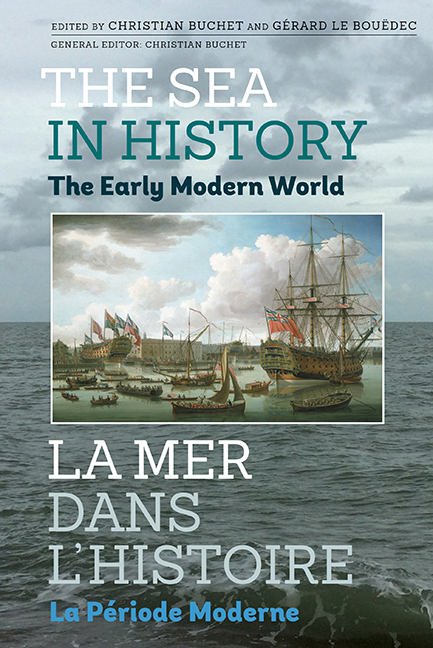Book contents
- Frontmatter
- Contents
- List of Illustrations
- List of Contributors
- Introduction générale et remerciements par
- General introduction and acknowledgements
- Introduction (français)
- Introduction (English)
- LA RÉUSSITE PAR LA MER:La reussite par la mer des territoires et des communautés littorales
- La construction d'un espace mondial: La circulation maritime et les ports
- La forte croissance de l'économie des pêches et des échanges
- Les acteurs de la dynamique maritime
- LA PUISSANCE MARITIME INSTRUMENT DE LA PUISSANCE POLITIQUE ET D'UNE STRATÉGIE GLOBALE DE RAYONNEMENT VOIRE DE DOMINATION: Les puissances maritimes occidentales
- L'ordre des Hospitaliers de Saint-Jean de Jérusalem, Rhodes et Malte, puissance maritime
- Portugal, the west seafront of Europe
- Les formes complexes de la prédominance de l'Espagne, première puissance mondiale de l'histoire
- Le maritime, fondement de la prédominance commerciale et économique des Provinces-Unies
- The keys to British success: trade as a motor and sea as a centre
- Le modèle français: la recherche par l'état de la prédominance maritime, réussites et échecs
- L'Europe Centrale et la mer à l'époque moderne
- Swedish and Danish rivalry to become great powers seen through the development of naval and merchant fleets
- Ambiguous relations between Russia and the sea: causes and consequences
- L'océan Indien, entre convoitises et indifférences
- Les puissances maritimes asiatiques
- L'Afrique
- La politique maritime et l'idéologie
- Mer et développement technologique
- Développement maritime et maîtrise économique et financière
- Développement maritime et maîtrise organisationnelle
- Conclusion (français)
- Conclusion (English)
- Conclusion générale par
- General conclusion by
- Miscellaneous Endmatter
- Miscellaneous Endmatter
Portugal, the west seafront of Europe
from LA PUISSANCE MARITIME INSTRUMENT DE LA PUISSANCE POLITIQUE ET D'UNE STRATÉGIE GLOBALE DE RAYONNEMENT VOIRE DE DOMINATION: Les puissances maritimes occidentales
Published online by Cambridge University Press: 11 May 2017
- Frontmatter
- Contents
- List of Illustrations
- List of Contributors
- Introduction générale et remerciements par
- General introduction and acknowledgements
- Introduction (français)
- Introduction (English)
- LA RÉUSSITE PAR LA MER:La reussite par la mer des territoires et des communautés littorales
- La construction d'un espace mondial: La circulation maritime et les ports
- La forte croissance de l'économie des pêches et des échanges
- Les acteurs de la dynamique maritime
- LA PUISSANCE MARITIME INSTRUMENT DE LA PUISSANCE POLITIQUE ET D'UNE STRATÉGIE GLOBALE DE RAYONNEMENT VOIRE DE DOMINATION: Les puissances maritimes occidentales
- L'ordre des Hospitaliers de Saint-Jean de Jérusalem, Rhodes et Malte, puissance maritime
- Portugal, the west seafront of Europe
- Les formes complexes de la prédominance de l'Espagne, première puissance mondiale de l'histoire
- Le maritime, fondement de la prédominance commerciale et économique des Provinces-Unies
- The keys to British success: trade as a motor and sea as a centre
- Le modèle français: la recherche par l'état de la prédominance maritime, réussites et échecs
- L'Europe Centrale et la mer à l'époque moderne
- Swedish and Danish rivalry to become great powers seen through the development of naval and merchant fleets
- Ambiguous relations between Russia and the sea: causes and consequences
- L'océan Indien, entre convoitises et indifférences
- Les puissances maritimes asiatiques
- L'Afrique
- La politique maritime et l'idéologie
- Mer et développement technologique
- Développement maritime et maîtrise économique et financière
- Développement maritime et maîtrise organisationnelle
- Conclusion (français)
- Conclusion (English)
- Conclusion générale par
- General conclusion by
- Miscellaneous Endmatter
- Miscellaneous Endmatter
Summary
ABSTRACT. The sea shaped the fate and independence of Portugal simultaneously. Its geographical position facing the Atlantic Ocean and its proactive opening up towards the sea discussed in this article were two elements that forged the soul of this ‘maritime nation’ that, thanks to the sea, was able to claim a place in History and a largely more important role than could be expected given its demographics.
RÉSUMÉ. La mer a forgé tout à la fois la destinée et l'indépendance du Portugal. Sa position géographique face à l'océan Atlantique et son ouverture volontariste vers la mer évoquée dans cette contribution ont été les deux éléments ayant forgé l'âme de cette « nation maritime » qui, grâce à la mer, a pu avoir dans l'histoire une place et un rôle sans commune mesure avec son poids démographique.
During the second half of the 15th century and most of the 16th century, Portugal took on a prominent position in the European scene as the precursor of the great oceanic voyages which since then regularly connected Europe to South America, the Indian Ocean, China and Japan. With the limited means of a small country, positioned at the western edge of the Iberian Peninsula, Portugal was able to build up an extraordinary maritime capability that lasted several decades against nearly all rivals. Naturally, this is due to its geographical position in the southwest extreme of Europe, facing the Atlantic Ocean, with no other choice but to turn to that ocean, which conditioned its destiny and became the reason for its political independence. This capability was built from the first moments of its existence as a nation and valued over time, with a set of other assets that, along with its geography, ended up being decisive. In the present essay I will attempt to explain this process, which went through several decisive stages, from independence in the 12th century, to the beginning of the maritime expansion with the exploration of the Atlantic and the discovery of the passage to India through the Cape of Good Hope. These are the stages I will attempt to highlight, explaining how they were lived and illustrating how they are related, even when they are separated by several decades.
- Type
- Chapter
- Information
- The Sea in History - The Early Modern World , pp. 429 - 439Publisher: Boydell & BrewerPrint publication year: 2017



